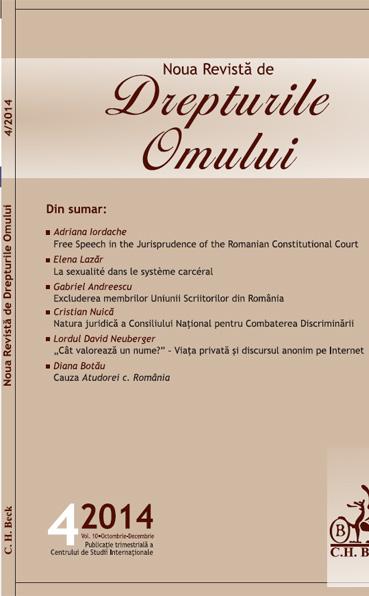Cauza Atudorei c. România
The case Atudorei v. Romania
Author(s): Diana BotăuSubject(s): Politics / Political Sciences
Published by: Centrul de Studii Internationale
Keywords: Right to liberty and security; Right to respect for private and family life; Prohibition of torture; psychiatric hospital; Movement for Spiritual Integration in Absolute; MISA
Summary/Abstract: Art. 5 of the Convention "Right to liberty and security" Art. 8 of the Convention "Right to respect for private and family life" Art. 3 of the Convention "Prohibition of torture" The complainant stated that she was repeatedly subjected to physical and psychological abuse, from her family, from a very early age. Her parents, especially the mother, were aggressive towards her, both verbally and physically. Parental abuse intensified after they learned that the complainant attend weekly yoga classes, organized by the Movement for Spiritual Integration in Absolute - "MISA". In 2003, the complainant, who was major, was admitted to the psychiatric hospital Socola by her parents against her will. Dr. F., who was a family doctor, wrote up the complainant on a reference sheet to a psychiatric hospital, diagnosing her with behavioral disorder schizoparanoid type. In the case file there is no evidence indicating that the complainant was consulted by Dr. F. before the writing of the reference sheet or of the manner in which the diagnosis was made. 2010 Sapoca psychiatric hospital management informed the Government, according to Dr. I., the complainant's admission was voluntary. Because of her health condition, the medical admission form to express informed consent was signed by the complainant's mother, on her behalf. Court: While the admission of the complainant was requested by her mother, this measure was taken, however, by an institution of state. Therefore, the liability of the authorities for the situation in the complaint becomes relevant and the Court concludes that the petitioner was illegally deprived of liberty under Article 5 § 1 of the Convention. The complainant received treatment without her valid consent, directly or indirectly, in circumstances in which a state hospital exercised complete and effective control over her. The Court considers that there was "interference by a public authority" in the complainant's right to respect for her private life. The Court considers that, following violations found, the petitioner must have suffered material damage that can not be repaired by the mere finding of a violation. Therefore, the Court grants the petitioner the sum of 15,600 euros, moral damages.
Journal: Noua Revistă de Drepturile Omului
- Issue Year: 10/2014
- Issue No: 4
- Page Range: 103-126
- Page Count: 24
- Language: Romanian

